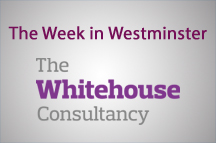.gif) Brexit got another adjective to describe itself this week, as Prime Minster Theresa May declared that it would be “red, white and blue.” But are we any closer to understanding what it means in practice?
Brexit got another adjective to describe itself this week, as Prime Minster Theresa May declared that it would be “red, white and blue.” But are we any closer to understanding what it means in practice?
Shadow Brexit Secretary Sir Keir Starmer won a minor victory in the House of Commons as he secured agreement from Theresa May that she would publish a plan of some sort before the Government activates Article 50. It did come with a catch, however, as the Government amended the motion so that it called “on the Government to invoke Article 50 by 31 March 2017”. But since most Labour MPs were evidently going to vote to trigger Article 50 anyway, it does make you wonder why the Government is going to so much effort to appeal the idea that Parliament should have a vote all the way to the Supreme Court. Still, if we get an actual plan rather than some coloured pieces of paper, we can chalk that up as a strike for Sir Keir.
Meanwhile, Andy Burnham used the debate to become the latest Labour MP to make an intervention on migration. He said that “the status quo, full free movement, was defeated at the ballot box and therefore is not an option”, before going further to suggest that free movement is “inherently discriminatory” and worked against socialist principles by allowing businesses to “treat people as commodities.”
 Immigration certainly seems to be the subject-du-jour at the moment, with Stephen Kinnock, Rachel Reeves, and Chuka Umunna among those recently calling for a change in policy. The question that few if any of them seem to have an answer to is how that the UK will be able to remain in the single market while securing modifications to the free movement principle. The approach at the moment seems to be to sweep this apparent contradiction under the carpet, but it’s a question that will have to be confronted at some point – along with how Labour can find a policy that will satisfy its two key bases, the traditional working class voters and the city-dwelling “metropolitan liberals” who seem to be at odds on this and other issues.
Immigration certainly seems to be the subject-du-jour at the moment, with Stephen Kinnock, Rachel Reeves, and Chuka Umunna among those recently calling for a change in policy. The question that few if any of them seem to have an answer to is how that the UK will be able to remain in the single market while securing modifications to the free movement principle. The approach at the moment seems to be to sweep this apparent contradiction under the carpet, but it’s a question that will have to be confronted at some point – along with how Labour can find a policy that will satisfy its two key bases, the traditional working class voters and the city-dwelling “metropolitan liberals” who seem to be at odds on this and other issues.
Meanwhile, while Mrs May was in Bahrain attending the Gulf Cooperation Council and making colourful declarations about Brexit, David Liddington (you know, him? The Leader of the House of Commons? Ah yes.) filled in her for at Prime Minister’s Questions, with Jeremy Corbyn’s place taken by Shadow Foreign Secretary Emily Thornberry. It was widely agreed that both took to the event more naturally than the usual occupants – PMQs has certainly seemed a little moribund over the last few months – but the consensus was that Thornberry came out on top. There’s talk that she could yet be a future leadership contender, but rightly or wrongly it’ll probably take a little more than a snappy PMQs or two to earn forgiveness for the now infamous “'Image from #Rochester” tweet.
The week finished with an unsurprising Conservative victory in the Sleaford and North Hykeham by-election. More interesting was the battle for second place, with UKIP pipping the Lib Dems to the post, while Labour limped into fourth. The difference in vote totals between the three wasn’t huge, but it supports the narrative that Labour is being squeezed out of the Brexit debate altogether and needs to turn it around fast. No pressure then Sir Keir.












